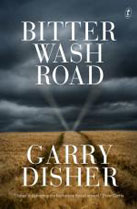 Garry Disher –
Garry Disher –
Gunshots have been reported just out of town and Constable Paul Hirschhausen is sent to investigate. Back in uniform, he runs a one-man cop shop in Tiverton, a bump-on-the-highway town three hours from Adelaide. If things go bad out on Bitter Wash Road his nearest backup would be his boss, Sergeant Kropp, and a couple of constables 40km away in Redruth. But the Redruth constables have made it clear they consider him a dog and a maggot. Cop logic says if the rest of his squad went down for corruption and he didn’t, then he must have survived by selling out his mates. They reckon Hirsch has a bullet coming and it can’t come soon enough to suit them – a pistol cartridge left in his mailbox makes that clear.
Hirsch covers his patch in a four-wheel-drive police-issue Toyota Hilux, casually raising a finger off the steering wheel to acknowledge oncoming drivers. We never sight a kangaroo but Disher puts us dead centre in rural Australia with that casual, iconic gesture. In Tiverton and its surrounds and people, Disher has drawn both a vivid and visceral picture of a backblocks bush town, its inhabitants ground down by the stresses of isolation, hard work and irregular, relentlessly shrinking incomes.
The next call-out takes Hirsch to a real crime: a body, female, dumped beside the highway – 16-year-old local girl Melia Donovan. His investigation of Melia’s death leads Hirsch on a trail of corruption and intrigue, with echoes of the past and bent cops that he’d prefer to leave behind. The story pulls no punches, with Hirsch uncovering a complicated web of cronyism, corruption, racism, infidelity, misogyny, rape and murder – Disher never letting up on the pace.
There is a lot to like in this story, with several unexpected and surprising changes in direction combined with Disher’s usual deft plotting and economically drawn but fully fleshed out main and peripheral characters. What resonates most however is Hirschhausen’s painful sense of isolation within an already isolated community. The corruption case in Adelaide ended his marriage, though he knows no copper’s relationship could ever survive a posting to Tiverton.
The role of lone cop in a small town sets Hirsch up as a protector, of course, but also as a father figure – the adolescents and young adults who populate the story are beautifully realised characters in all their naivety and surliness, and Hirsch’s interactions with them show a different, gentler side to his character.
